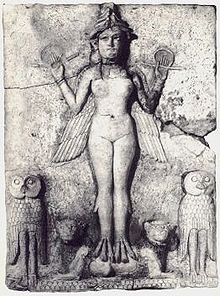This is an old revision of this page, as edited by Shulgi (talk | contribs) at 14:18, 24 August 2006. The present address (URL) is a permanent link to this revision, which may differ significantly from the current revision.
Revision as of 14:18, 24 August 2006 by Shulgi (talk | contribs)(diff) ← Previous revision | Latest revision (diff) | Newer revision → (diff)
The Burney Relief is an early 2nd millennium BC (ca. 1950 BC) Mesopotamian (Babylonian, not Sumerian or Assyrian, as sometimes described) terracotta relief of a winged goddess-figure with eagle's talons, flanked by owls and perched upon supine lions. It is in a private collection, probably in Japan, though it became well-known through its former on-loan exhibition in the British Museum in London. The goddess-figure has been identified with the Sumerian Kisikil-lilla-ke of the Gilgamesh epos, and, somewhat improbably, with 7th century BC Babylonian Lilitu. Otherwise, she has been identified as the goddess Inana (Sumerian) or ] (Babylonian) during her visit to the Underworld.
The piece has sometimes, on stylistic grounds, been regarded as not genuine, but scientific testing now appears to confirm its authenticity. A very similar relief dating to roughly the same period is preserved in the Louvre (AO 6501).
F. Davis, "A puzzling "Venus" of 2000 B.C.: a fine Sumerian relief in London". The Illustrated London News 13 June 1936 (issue 5069) 1047.
D. Opitz, "Die vogelfüssige Göttin auf den Löwen". Archiv für Orientforschung 11 (1936-37), 350-353.
E.D. Van Buren, "A further note on the terra-cotta relief". Archiv für Orientforschung 11 (1936-37), 354-357.
H. Frankfort, "The Burney Relief". Archiv für Orientforschung 12 (1937-39), 128-135.
Th. Jacobsen, "Pictures and pictorial language (the Burney Relief). In: M. Mindlin, M.J. Geller and J.E. Wansbrough, eds., Figurative Language in the Ancient Near East, 1-11. London: University of London School of Oriental and African Studies.